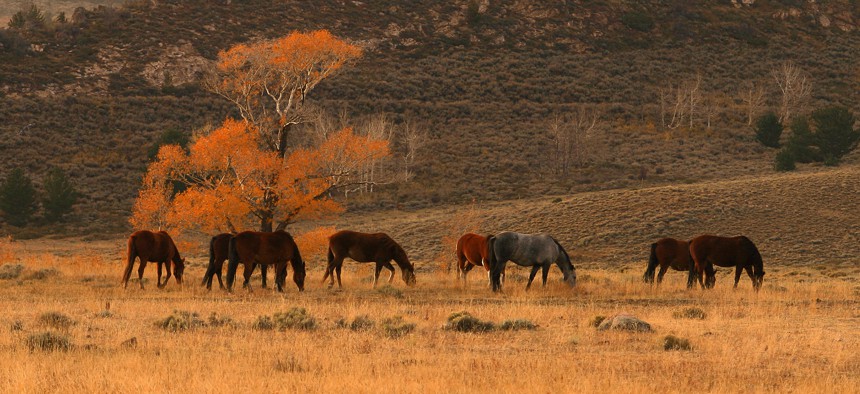
Jana Wilson/BLM file photo
The Trump Budget Removes Limits on Wild-Horse Sales, Threatening an Icon of the American West
The mustangs better start running. The president's plan allows them to be sold for slaughter.
If you’ve ever longed for a horse, now is the time to act. Make a dream come true and help save an American classic. The US Bureau of Land Management (BLM) puts wild mustangs and burros up for adoption, and president Donald Trump’s new budget threatens their existence, say conservationists.
The bureau manages more than 73,000 wild mustangs and burros on 40,000 miles across 10 western states. It’s a costly project. The horse-management budget has gone from $36 million in 2008 to $80.6 million in 2017. Trump’s budget 2018 proposes trimming $10 million from that. The cuts will be covered, however, by removing limits on horse sales, with the aim of making money and lowering overall maintenance costs.

That could mean wild mustangs will be sold to foreign slaughterhouses and eaten as meat. Horse meat isn’t taboo everywhere, though it’s never taken off in the US. The last American horse slaughterhouses were shut down a decade ago. Still, according to the American Society for the Prevention of Cruelty to Animals, more than 100,000 horses annually are trucked to neighboring countries for consumption.
Those figures have not thus far included the wild horses under BLM’s care. Some are trained by prisoners and then work with US Border Patrol. Others are adopted or sold. The 1971 Wild Free-Roaming Horse and Burro Act permits the sale of unadaptable animals over 10 years old. But Congress consistently approves the agency’s budget with a caveat that animals can’t be sold for slaughter, a restriction that could be imposed again in the current process.
In a May 23 statement on the proposed budget, BLM explained that wild-horse management is difficult because the creatures are legion, and adoption and sale rates are low: “The president’s budget would help reverse the declining health of wild horse and burro herds and the public rangelands on which they—and many other species—depend, by allowing the BLM to use the full range of tools identified in the 1971 Act, including humane euthanasia and unrestricted sale of certain excess animals.”

Got land? (BLM)
Removing limits undermines conservation efforts, however, according to advocates. More sales will lead to more horses captured, gathered, and sold off, freeing terrain for foraging livestock. The National Cattlemen’s Beef Association and state rancher groups have been explicit about seeking support for their goals and pushed for a shift in BLM’s position.
“This is simply a way to placate a very well-funded and vocal livestock lobby,” Laura Leigh, president of the nonprofit protection group Wild Horse Education, told Courthouse News.
The tug of war between conservationists and commercial interests started long before Trump was in office. But commerce definitely has an ally in a president who has sold his own brand of steak. But legislators could still insist on barring sale for slaughter. So now it’s up to Congress to stand up for the wild mustangs and burros, icons of the American West.






